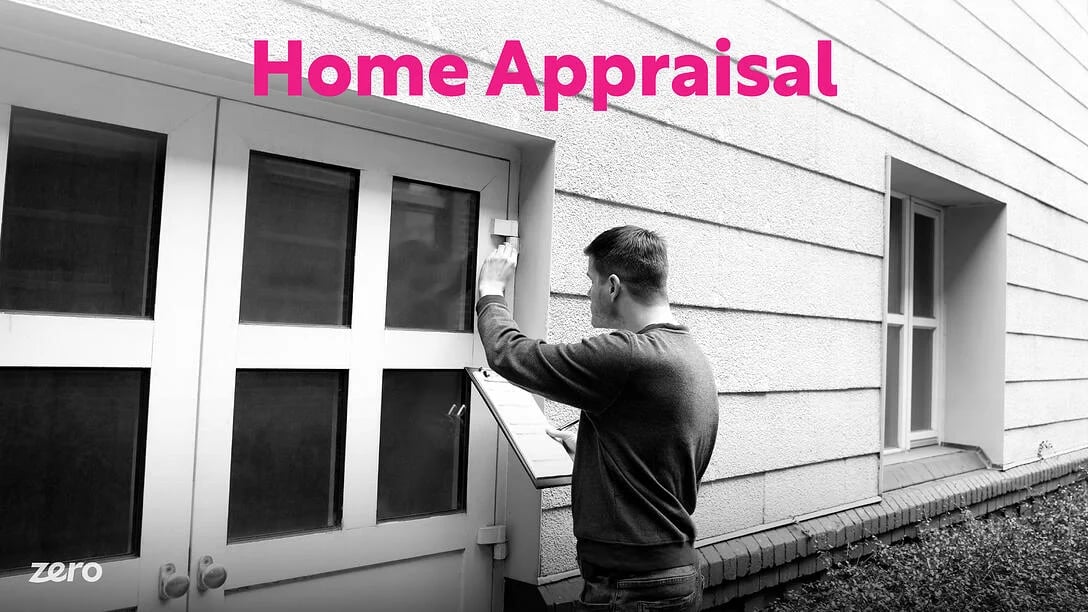What Is The Home Appraisal Process? How Appraisals Work

Buying a home? You’ll likely need to get it appraised before you receive the clear to close. If you’re wondering what is the home appraisal process, or why you should care, this article is for you. We’ll cover everything you need to know on both the buy and sell side of the appraisal.
How Do Home Appraisals Work?
Simply put, the home appraisal process is when a licensed home appraiser carefully reviews and inspects the home you’re looking to buy. The appraisers job is to provide a fair valuation on the property. This valuation is not the price the house is currently listed for, but what the house is worth in the eyes of a bank/lender. Getting a home appraised can help prevent overpaying for a property.
How To Order a Home Appraisal
First and foremost, as the home buyer, you may be required to get the property you wish to buy appraised. Unless you’re paying for the house fully in cash, many lenders will demand the home gets appraised before they issue a loan.
Appraisals typically happen once an offer has been accepted. The mortgage lender will order the appraisal, and the results will be shared with all parties involved. Lenders will only issue a loan up to the appraised value of the home.
How Long Does a Home Appraisal Take?
The home appraisal process doesn’t take long. Generally speaking, the professional appraisal will finish the job in just a few hours. Keep in mind, the appraisal is not the same as a home inspection. The appraiser will still carefully review the home, but their scope of view differs from what an actual home inspector will look for.
How Much Is a Home Appraisal?
On average, a home appraisal costs between $200 and $700. There are a few variables that can influence the cost of the appraisal. Such variables include the size of the home. A home that is only 1000 square feet may cost $200 to appraise, whereas a home that is 3,500 square feet may be closer to $600 or $700. Additionally, the type of home may also influence the price. A one story condo may be less expensive to appraise than a 3 story colonial.
What Do They Look for in a Home Appraisal?
First and foremost, a home appraiser will inspect the quality of the home. Is the home in good condition, or does a lot of work need to be done to it? For example; are the hardwood floors in good condition, are there stains on the carpet, is the roof, gutters, shutters, and doors in good condition? Once the basics are inspected, the home appraiser will begin to look for value adding items.
Items that add value to your home are not necessarily essential, but are certainly appreciated by the buyer and can be rather expensive. These items include; decks, energy-efficient appliances or systems, fireplaces, a fence that surrounds your property line, interior trim work, and various updates/upgrades to the home.
How To Prepare for an Appraisal: 6 Steps
If you’re looking to sell your home, there are various steps you can do to help your house appraise out, or increase the appraised value of your home.
Step 1: Get Your Paperwork in Order
If you’ve lived in the home for a while, there is a good chance you’ve done some work to the home. Perhaps you’ve replaced the windows, upgraded the electrical system, replaced the HVAC system, or added a deck. Getting all of your paperwork in order, and leaving that paperwork on the counter for the home appraisal, will help the appraiser get an understanding of what work has been completed.
Additionally, they’ll want to see the closed permits for the jobs completed, so be sure to have the permit information neatly organized as well.
Step 2: Organize Your Home
It can be difficult to look past a cluttered home. A neatly organized home is always easier on the eyes, and makes the home look better. Not only does a neatly organized room look better, it’s also more practical. If your attic or crawl spaces are cluttered, and the appraiser can’t move around the mess, they may not be able to fully complete the valuation.
Step 3: Do Minor Upgrades
Before the home is appraised, you may want to complete some basic work yourself. If doors are damaged, you should replace them. If there is a huge stain in the carpet, consider renting a carpet cleaner to remove the stain. You don’t need to go crazy and replace the entire kitchen, but there may be a list of items you can complete yourself, without breaking the bank, that can help improve the appraised value of your home.
Step 4: Give Your Yard Some Love
Your entire property will be appraised, not just the inside of your home. Make sure your grass is mowed and edged, add some mulch to the mulch beds, and plant some flowers. Dedicating a Saturday or Sunday to sprucing up the yard will likely pay dividends.
Step 5: Identify Major Damage Before the Appraiser Does
If the foundation is leaking water, if the roof needs to be replaced, or if the sliding door doesn’t open to the deck, get that fixed before it’s identified. Understandably, these are not cheap fixes, but it may make the difference between selling your home and not selling your home. Remember, a bank will not issue a mortgage for the listing price unless the house appraises for at least the listing price. If there are major damages with the home, it may not appraise for the price you were hoping for!
Step 6: Ensure All Safety Equipment Is Working Properly
The house should have the right placement of smoke alarms. If there is a security system, make sure it works properly. These small details are often overlooked by the seller, but a professional quickly picks up on them and begins to deduct against the home's value.
What Adds Value to a Home Appraisal?
Craftsmanship, build quality, and the condition of the home will all help increase the value of a home. Having a new roof, updated electrical, a well maintained and functioning HVAC system, and updated rooms will all help improve the home's value.
You don’t have to go nuts and redo your entire house before putting it in the market. There are plenty of small jobs one could do themselves that can help increase the value of the home. Adding updated lighting fixtures, faucets, replacing doors, and doing a thorough deep clean will certainly pay dividends.
If you were looking to make investments in the home before listing it, be sure to spend that money wisely. Don’t replace the appliances if the roof is leaking. If the siding is chipped or falling off the house, be sure to address that before you add ceiling fans to the bedrooms. Updated kitchens and bathrooms are certainly a huge selling point in any market, and will help increase your home's value.
What Hurts a Home Appraisal?
If the home is in bad condition, that will certainly negatively impact the appraised value of your home.
For instance, if your hardwood floors are cracked, discolored, or if there are boards missing, that will be a red flag. If the yard is overgrown and not maintained, that will also negatively impact the home's value.
Buyers and appraisers understand not every home is brand new construction. However, it’s hard to look past a leaky roof or a cracked window.
How to Dispute a Home Appraisal
In the event you do not agree with the results of the home appraisal, you do have the opportunity to dispute the appraisal.
The first thing you’d have to do is receive a copy of the appraisal. Figure out what negatively impacted the home's value, and verify the information is correct. For example, if the report suggests the HVAC is dated, but you just replaced the system in recent years, you have every right to bring that up and dispute the claim.
If the appraiser failed to identify the upgrades or improvements in the home, you can also call attention to all the changes you’ve made and the money you spent.
Home appraisers aren’t perfect. There certainly can be a margin of error on the report. In the event you believe the report is off base, you can request a second appraisal.
What happens if the home appraisal is less than the sale price? That happens all the time. If the home buyer is fixed on this home and would happily over pay for it, they’ll still have an opportunity to do so. The bank will only provide a mortgage for what the appraised value is. If the appraised value is less than the asking price, and the buyer still wants the home, they’ll have to make up that difference with cash.
This is rare as people generally don’t want to overpay for something. More commonly, the seller will need to lower their listing price to be aligned with the appraised value of the home.
Our Mortgage Learning Center features blogs on a wide range of mortgage and refinancing topics.
Difficult But Worth the Work
Getting a home appraised is looked at as an unavoidable step in the home buying process. Although many people are intimidated with the appraisal process, as a home buyer, you ultimately want to get this done.
A home appraisal is designed to provide a fair, unbiased, valuation on the home. The listing price is not always the appraised price. In many cases, the appraised price may be lower. Without knowing the true value, you may overpay for a home.
As a home seller, there are various steps you can take to help increase the value of your home. Many steps can be completed on a tight budget, and most of them won’t take a great deal of time.
Looking to Refinance?
This page last updated: October 6, 2022
Read more on this topic below.

When you buy a house and start making mortgage payments, your payment consists of four different components, known...

If you have gone through the pre-approval process but need to take a deeper dive into how much house to buy,...

The vast majority of mortgage loans require you to put down a certain percentage of the selling price upfront....

Whether you’re a first-time buyer or you’ve purchased a home before, you’ve likely heard of a homeowner’s association....

People buy their homes for a number of reasons. Affordability, stability, and comfort are some of the most...

There’s a lot of expenses to keep in mind when you’re thinking about buying a home. Between the price of the home, property taxes, your mortgage...

Conventional loans are mortgages offered by private lenders, banks, and institutions that are not backed by the government. Unlike FHA, USDA,...

Some homebuyers refuse to purchase a property if it is part of a property owner association. On the...

Research indicates that 58% of homeowners in HOA communities and single-family homes pay an average monthly fee...

Private mortgage insurance is something millions of homeowners pay for each year. However, this type of insurance does not protect

When you first set out to buy a home, it can feel like you’re taking an exam you forgot to study for. You have to make quick...

When looking to refinance or buy a house, the pre-qualified vs pre-approved mortgage debate can be...

A mortgage is often the largest monthly expense homeowners pay. The thought of reducing the amount...

A home doesn’t just fall into foreclosure status. There are stages and processes that take place behind the scenes before...

It’s likely that your mortgage loan will be the largest loan you have during your lifetime. Mortgages are not a one size...

Refinancing your home can save you thousands of dollars per year! When you extrapolate that savings over...

For many people, owning a home is part of the American dream. To make this dream a reality, most people will take out a...

Whenever you’re looking to buy a house, you’ll quickly realize there are a lot of fees associated with obtaining a mortgage....

A bridge loan is a short-term loan a borrower may use while a more long-term financing contract is finalized. Bridge...

A loan estimate is crucial to obtain when looking for a loan. This estimate not only gives you the details of a mortgage but also compares offers...

There are many moving parts and various people you’ll deal with throughout the homebuying process....

If you’re looking to buy a house, and do not have a mountain of cash saved up, you’ll need to consider getting a mortgage to help you finance this...

If you find a property that you’re highly interested in buying but are concerned that the seller might choose...

If you’re an active service member, a veteran, or the surviving spouse of a veteran, and you want to ...

Innovative and cost-effective home improvement ideas are all over the internet, especially when it comes to...

There’s no doubt, COVID-19 changed the world in countless ways and took us all by surprise. From an...

Whenever you are borrowing money, whether it’s for a new mortgage, a refinance, credit card, or car loan, you’ll hear...

If you’re new to buying a home, you probably have quickly realized the overwhelming amount of options there...

If you’ve already gone through the lengthy process of writing offers, securing financing, and arranging inspections for your...

One of the most important steps to buying a home is deciding on a mortgage loan and deciding on a loan involves settling on a good...

First time home buyers are often surprised when they learn about all of the expenses that are associated with ...

Purchasing real estate is not as simple as finding the right home, submitting an offer, and signing the closing paperwork; many...
